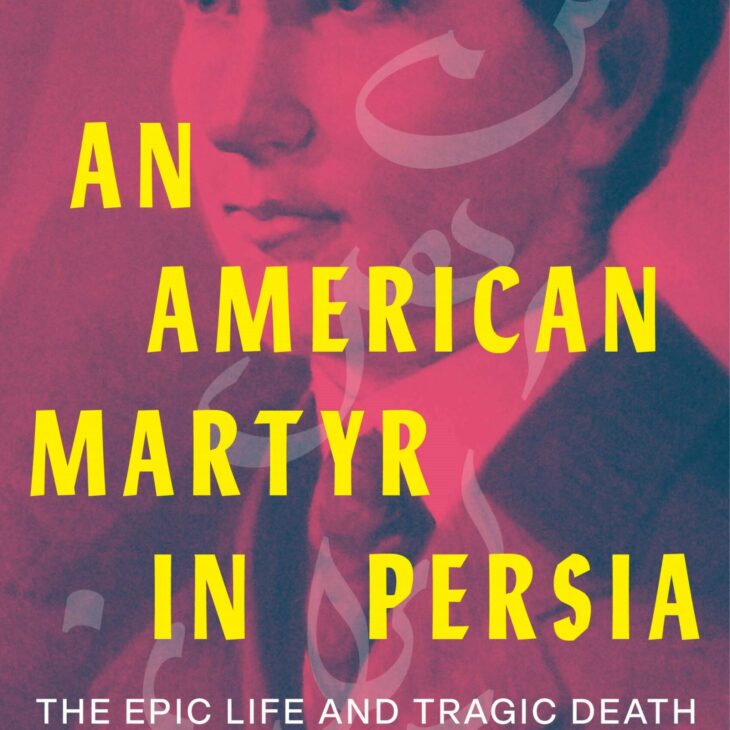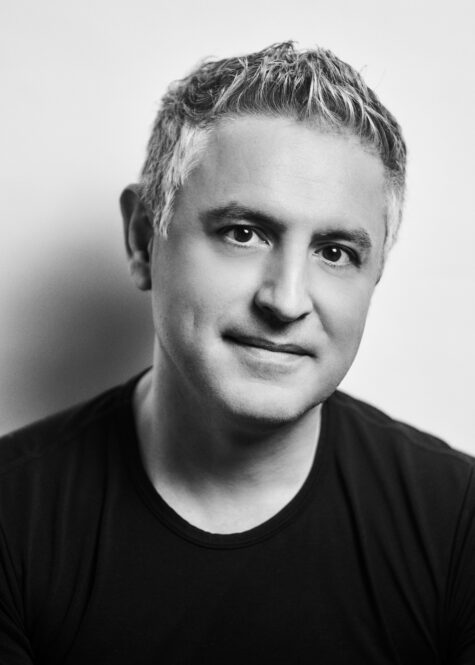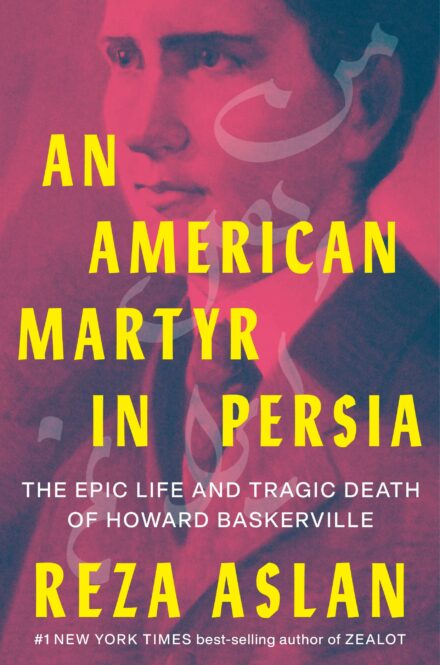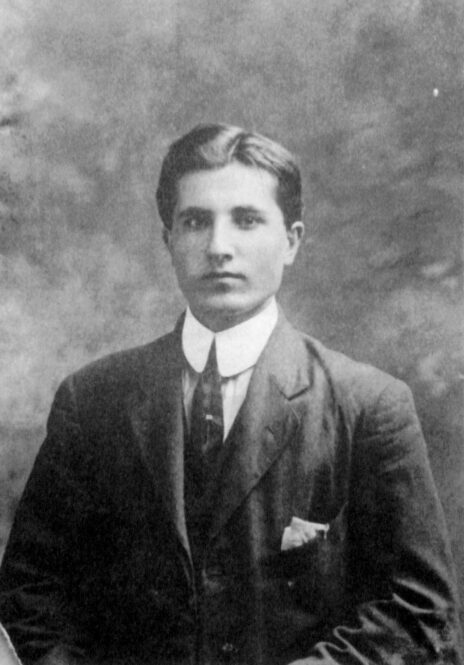A Nebraska Pastor Died a Martyr in Iran. Here’s Why You Should Know His Name.
October 25, 2022

Author and religion scholar Reza Aslan was born in Iran and moved to the United States as a child.
He returns to his birthplace in his most recent book, “An American Martyr in Persia: The Epic Life and Tragic Death of Howard Baskerville,” the forgotten story of a young Presbyterian clergyman from Nebraska who joined Iranian resistance fighters and died an Iranian national hero. Given the recent uprising in Iran following the death of a young woman in police custody, Aslan says Baskerville’s story is more relevant than ever.
“Once again, the people of Iran are on the streets, fighting for the same basic rights that so many Iranians, and one American, died for in Iran’s first revolution. Once again, Iranians are looking to the world for help,” Aslan says. “We must amplify the voices of this revolution, use our platforms to shine a light on the government’s atrocities. We cannot let the world turn a blind eye to what is happening in Iran. We must make sure that the young men and women risking everything to raise their voices will be heard by the world, just as they were a century ago.”
Aslan recently spoke about Baskerville and his new book with Silma Suba and Monique Parsons of Interfaith America Magazine. The conversation has been edited for clarity and length.
Share
Related Articles
American Civic Life
Is This a Time for Bridgebuilding? 5 Leaders in Conversation
American Civic Life
We Commemorate, We Commit: Out of Catastrophe, a Conversation on Connection and Repair
American Civic Life

Author Reza Aslan. Photo by Shayan Asgharnia

Photo courtesy of W.W. Norton & Company

Howard Baskerville. Public domain
Silma Suba: I think what struck me the most reading about Baskerville is this is an interfaith story. At its heart, it’s a story about a Christian missionary who fought alongside his Muslim students in a country that was not his own. You’re a scholar of both religions who has lived both religions. What drove you to tell his story?
Reza Aslan: I heard bits and pieces of this story growing up [in Iran], and I would see his name on a street sign, or a coffee shop, or a school. I only knew sort of the most basic facts of his life, but even as a kid, they were pretty interesting to me. I didn’t know any Americans had come to Iran and fought alongside his Iranian students against the Shah. I left Iran in 1979. So, from 1977 to 1979, I’m watching this revolution slowly start to pick up pace around me. And by 1979, I mean, it’s very clear that there’s a massive transformation being witnessed in Iran. [Baskerville’s] name kept surfacing, at a time in which many of the revolutionaries just simply assumed that the United States would support the revolution against the Shah, which of course, was not correct.
And then, partly it has to do with the fact that the 40 years that I have lived in the United States has been fraught by this intense animosity and conflict between Iran and the United States. And so, resurrecting this character, this American who died for Iran, I thought, would be a really interesting way of challenging the assumptions that we have, when it comes to the inherent conflict between these two peoples.
And one of those very interesting points was that there were a lot of rumors, and it’s in some of the historical documents as well, that in quitting his missionary post, and joining the revolution, that Baskerville had abandoned Christianity. But I found these two letters … [where] he clarifies that this is his duty as a Christian, that in many ways, he had come to Tabriz not just to preach the gospel, but to be a witness to the gospel … and show the people that he had been living with for almost two years, what it actually means to be a follower of Christ.
There’s a lot that Christianity and Islam have in common with each other. But one thing that is often quite different is the expression of faith. Because in Islam, and especially in Shia Islam, faith is meaningless unless you are willing to die for it. And I think that that is something that Baskerville may have understood theoretically, the core notion of sacrifice in Christianity. But when given the opportunity to actually live that out, it took learning these lessons from his students to actually get him to do that.
SS: What do you hope that people will take away from reading this book, especially noting that he’s no longer well known in Iran or in the United States?
RA: I have a production company in Iran, and it was almost impossible for them to find anyone who knew anything about Howard Baskerville. The memory has completely faded.
And yet, here’s this American evangelical Christian, who, in the name of his identity as an American, fought alongside a foreign people for their rights, who in the name of Christianity decided that what Christ would do would be to sacrifice himself, not just for the souls but for the lives of people that he has nothing in common with. And to me, that’s the model of what it means to be Christian and what it means to be American that I want Howard Baskerville to represent. And it’s a model that I think we are so desperate for right now. A century later, we have a lot of lessons to learn from it.1
Monique Parsons: In the book, you write about diversity in Iran in the early 20th century: the indigenous Christian groups, Muslims, Buddhists, Zoroastrians. At Interfaith America, we talk about America as a potluck nation, not a melting pot, and I am interested in how you connect Iran’s diversity to our religiously diverse society.
RA: Tabriz is a quintessential border town; it bordered both the Russian Empire and the Ottoman Empire. And it becomes a crossroads for East and West; towns like that, historically, have become enormously eclectic, ethnically, religiously. Even to this day, when you go to Tabriz, their primary language is Azeri or Turkish. But there’s also something that’s kind of an accident of history – it’s a huge center for Zoroastrianism, which is the pre-Islamic religion of Iraq. And then, on the other hand, it just also happens to be the place where the Bab, who becomes … the person who then leads the way to the Bahai tradition …. Tabriz happens to be where he was executed. You see a lot of Buddhists, Persian Buddhists in that area, and it became this kind of center of religious experimentation and diversity. And as I say, in the book, this made it both a great place for evangelical missionaries. Because it is a deeply religious place, a place full of faith.
SS: What would Baskerville be doing today? And where do you see Baskervilles today?
RA: It’s really in the youth of this country, the 20-somethings like Baskerville was, who are being confronted by a planet on fire, a political system that is utterly corrupted, and yet they’re still figuring out ways to make change, whether you’re talking about the Parkland kids, Greta Thunberg or Malala [Yousafzai]. Also, you look at the religious trends, especially here in America, and you see the shrinking percentages of Americans willing to identify themselves as Christian, it’s now at 64%, the lowest it has ever been. One thing that gets lost in these poll questions is that people aren’t abandoning Christianity. They’re just refusing to call themselves Christian any longer. I think that if Baskerville were 22 today, as opposed to in 1907, I think that’s precisely where he would sort of fit. He would have the same beliefs, but he would have a range of different ways of expressing them.



